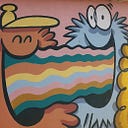‘Circus of Books’ Doc Reminds Us Why Adult Bookstores Mattered
There was a special mix of shame and liberation when you visited a gay bookstore that contained adult material. When I ventured into my first one in the Nineties, you might start out flipping through an Edmund White or Andrew Holleran novel before slowly making your way to the magazines: After Out and Genre and The Advocate, there was the sexy stuff like Bluebook, Mandate, Torso, and Inches. If you were lucky, they also had a selection of VHS tapes or albums or DVDs to rent and buy, as well as a stash of poppers, dildos, and lube. More than porn palaces, they were safe spaces where you could peruse and potentially spot someone with whom you’d strike up a conversation — and maybe more.
While I never visited Circus of Books in West Hollywood, California, it was apparently the daddy of all such spots until it closed in 2019. Now, thanks to Rachel Mason’s documentary, Circus of Books, about her parents’ business — which premiered last year at the Tribeca Film Festival and is now available on Netflix — an entirely new audience is able to understand why many in the LGBTQ community saw porn shops and bookstores as something closer to community centers rather than tawdry jerk-off joints.
Mason basically has three documentaries on her hands — a gay-liberation history, a tale of civil-liberty battles, and an exploration of family dynamics — and the narratives have been stitched into one charming, if uneven, package. It kicks off by quickly sharing the story of the LAPD raid at Silver Lake’s Black Cat Tavern in 1967, and the protests it sparked, and then explains how AIDS decimated the community just as many were creating public lives for themselves.
Her parents — Karen and Barry Mason — didn’t intend to get into porn in the early 1980s, and Rachel connects the dots of how they met Larry Flynt and then took over the shop when the previous owners couldn’t pay their bills. They battle right-wing attacks and anti-pornography and obscenity laws during the Reagan and Bush administrations and through the conservative culture wars. They even partner with gay porn icon Jeff Stryker — who is interviewed in the movie and looks great in his late fifties — to produce original gay porn flicks, along with director Matt Sterling. At their height, they claim they were putting out two new tapes a week.
First and foremost, don’t get it twisted: Karen Mason is not a sweet old Jewish lady. But then again you don’t run a gay porn shop for nearly 40 years by being “nice.” She had a tight grip on the store and her employees, and instilled a Mafia-like secrecy in her children about the true nature of their family’s hardcore business. She’s devoutly religious and, at the same time, permissive, instilling guilt and shame in her children (we see her berating a son at synagogue to learn Torah passages for his bar mitzvah) while seeming to look the other way when patrons are getting up to shenanigans in the shop. Dad Barry plays the goofy, lovable one well, and they both have decided to purport to have an ignorance to why anyone would get pleasure (or pay money) for DVDs with titles like A Rim With a View, Black Gang Bang, and Hole Whores of the Holy Empire.
The most heartbreaking part is when it becomes clear that the bookstore is really just a capitalistic venture for Karen, and she never got over her own homophobia. We see this after Rachel turns the camera on her brother Joshua, and they discuss his own difficulty coming out to his mother. “Everything about the business was really in support of the family, ironically,” Josh explains. “The ‘gay’ part of it fell on the ‘business’ side of that mental dividing line.” Luckily, Karen does educate herself, attend PFLAG meetings, and eventually comes to acknowledges her own hypocrisy.
In more adept hands, we may have gotten a deeper sociological exploration of what the store meant to those in the gay community. As it stands, through her intimate access, Rachel was able to offer a close-up look at the duplicity, complicity, and audacity of her parents, and the impact it had on her family as well as a larger community. She also interviews former customers and employees — fans of RuPaul’s Drag Race will be excited to see that Alaska Thunderfuck (a.k.a. Justin Andrew Honard) once worked there and shares his anecdotes and pearls of wisdom — who help fill in some of the blanks.
Although she does visit the inimitable ONE Archives Foundation in Los Angeles to make a small donation of materials, when Karen begins to toss boxes of smut into the dumpster behind the shop, it felt like watching a horror movie — an essential queer history being lost forever. But Karen never really cared about the product she was slinging. For her, it might as well have been a hardware store, the dildos replaced with plungers and the cock rings as easily dispensed as nuts and bolts. But for so many other nameless patrons, Circus of Books felt like liberation, and brought joy and pleasure and escape for generations. As one person explains: “It was a place you could go and find other people like yourself.” And now it’s gone. Ultimately, that’s why Rachel Mason’s accomplishment feels extraordinary: She’s made a movie about hardcore gay porn that can be enjoyed by the entire family. It will hopefully educate a large swath people — without freaking them out.
Originally published at https://www.rollingstone.com on April 27, 2020.
